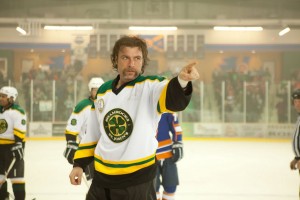Liev Schreiber: Leading a Double Life on Ice By Richard Crouse
 In Goon Liev Schreiber embodies one of the great hockey traditions. As Ross Rhea he’s a bruiser, the kind of hockey player that makes Don Cherry grin from ear to ear. Whether he’s gliding down the ice or trading blows with another player, he looks like a natural. Like someone who grew up on skates.
In Goon Liev Schreiber embodies one of the great hockey traditions. As Ross Rhea he’s a bruiser, the kind of hockey player that makes Don Cherry grin from ear to ear. Whether he’s gliding down the ice or trading blows with another player, he looks like a natural. Like someone who grew up on skates.
“I could never play hockey,” he admits, but adds, growing up on New York’s Lower East Side gave him the chance to catch Rangers games from time to time.
How then did he manage the professional level hockey he plays in the movie?
“Easy,” he says, “I had a fantastic double. But I also went to hockey camp for six weeks and polished up my skills and now I play. I love it. We played almost every night on set and now I’m looking for a league in the city to join. A very elderly gentleman’s league. The problem is I’m no good with the puck. All I’m good at is hitting and unfortunately it’s not nice to do that in these leagues.”
For the Yale educated actor the trick to creating a believable character was research. At six-foot-three, with broad shoulders and a Wendel Clark handlebar moustache he looks the part, but he dug deeper to humanize a man who beats people up for a living.
“I don’t know how to approach anything than from the beginning,” he says. “What is an enforcer? Who can I talk to? And I quickly hooked on to Bob Probert (one half of the Red Wings’s “Bruise Brothers”). I wouldn’t say the character is based on him but I would say he was in my heart when I was playing this role.”
Added to the on-ice action is his character’s impending retirement from the game.
“You take somebody like Ross Rhea who’s probably been skating and playing hockey since he could walk. That’s all his life was ever about and at the tender age of thirty-nine or forty it is suddenly over and there is nothing else. There are no more fans. There are no more teammates. No more games. That is a hard transition for a guy to make.
“I’m not so sure that some of these tragedies that have occurred with these enforcers didn’t have something to do with that. What you’re left with is a battered body, a battered spirit and a habit, maybe, of taking things to control pain, and doing things to control pain.
“Goon is a love letter to those guys. It is saying to them, You’re not undervalued, you’re not underappreciated. We know what you went through and how much of your body, mind and spirit you gave to this game in the course of your life and we’re grateful you did.”
One thing Schreiber didn’t do to prepare was revisit a classic hockey movie.
“I had seen Slap Shot years ago and loved it,” he says, “but I put it out of my head because I wanted to start with a clean slate.”
